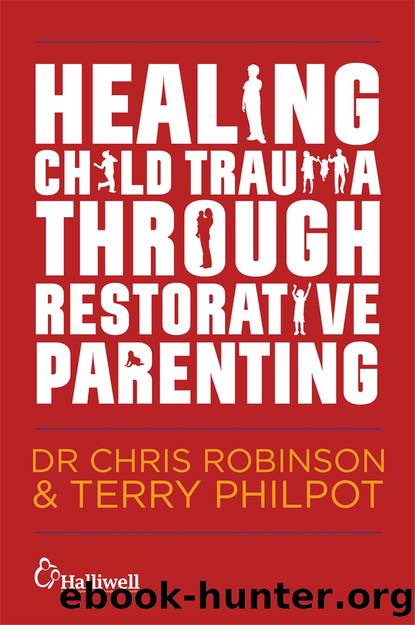Healing Child Trauma Through Restorative Parenting by Andrew Constable

Author:Andrew Constable
Language: eng
Format: epub
ISBN: 9781784502157
Publisher: Jessica Kingsley Publishers
Published: 2016-05-21T00:00:00+00:00
This reflects an important element of the programme â that what might appear mundane and routine can be mindfully therapeutic if considered part of the childâs lived experience.
1The first lines of Philip Larkinâs poem, âThis be the Verseâ are âThey fuck you up your mum and your dad./They may not mean to, but they do.â
CHAPTER 5
Itâs the Relationship that Counts
When we say that a child needs therapy we do so on the assumption that contact with the therapist will allow the child to gain insight into her condition and change. Such an assumption is, however, flawed. First, because it assumes that the child has no other influences upon her behaviour, whereas, in fact, she is subject to a host of divergent and differing influences. But, second, it unfairly places responsibility for change on the child.
Of course, there is sometimes value in working individually with a child to help them to process thoughts and feelings which they might otherwise find it difficult or impossible to do. But, too often, the assumption is that such individual âtherapyâ is a means by which the child can be helpfully changed so as to be able to cope with traumatic life experiences, stressful relationships and toxic environments. However, a child should not be expected to adjust their thoughts and feelings as an individual as a means of recovery. To develop and grow through the actual experience of positive relationships, participation, involvement and engagement within a safe and fully nurturing environment is the means by which lasting recovery can be achieved. It is the responsibility of adults entrusted with the care of the child to provide and maintain this context, and we should not expect any form of structured therapy to mitigate for the lack of it.
Thus, the recovery programme is one which surrounds the children with therapy by creating the therapeutic environment which we described in Chapter 3. It is important, however, that if children are to benefit fully from the programme and it is to be effective, then staff (that is, the therapeutic practice team) should have ownership of the programme. If not, they are not only hampered in their ability to help the child, but also their dissatisfaction can influence the whole environment, which itself will, apart from other effects, have an impact upon the child.
Therapeutic parents need to know what the programme aspires to do and why and how, and why it is better than other programmes in achieving its aims. One therapeutic parent, Diana Jepson, explained to us:
Working with the model is important â itâs very different from how it was. Without the model it was more about child minding, now itâs doing something to make a difference for a child. It used to be almost natural for children to get a criminal record â expectations of âcare kidsâ were low, whereas as now itâs about getting a good education, going into foster care; good outcomes are the way now. Itâs almost like we look after our children now as though they were our own.
Download
This site does not store any files on its server. We only index and link to content provided by other sites. Please contact the content providers to delete copyright contents if any and email us, we'll remove relevant links or contents immediately.
Spare by Prince Harry The Duke of Sussex(5197)
Tuesdays with Morrie by Mitch Albom(4784)
For Baby's Sake(4573)
Machine Learning at Scale with H2O by Gregory Keys | David Whiting(4313)
Never by Ken Follett(3957)
The Five People You Meet in Heaven by Mitch Albom(3569)
Fairy Tale by Stephen King(3399)
Reminders of Him: A Novel by Colleen Hoover(3121)
Will by Will Smith(2920)
Tuesdays With Morrie by Mitch Albom(2763)
The Clitoral Truth: The Secret World at Your Fingertips by Rebecca Chalker(2720)
Borders by unknow(2315)
Friends, Lovers, and the Big Terrible Thing by Matthew Perry(2230)
The Body Keeps the Score by Bessel van der Kolk MD(2217)
Cruel to Be Kind by Cathy Glass(2206)
The Stranger in the Lifeboat by Mitch Albom(2123)
Love on the Brain by Ali Hazelwood(2078)
Finding Chika by Mitch Albom(1968)
New Morning Mercies: A Daily Gospel Devotional by Paul David Tripp(1920)
